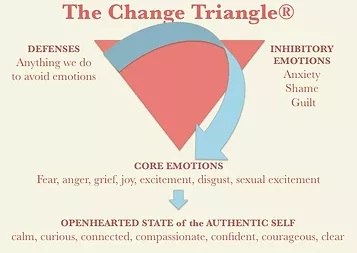

The change triangle is becoming my go-to tool helping me to understand what I am feeling.
Feelings. And the core emotions I have so fastidiously defended against. I spent 43+ years putting my defenses up so that I would not come in contact with my core emotions. Even now when I do this, the result is me using inhibitory emotions to block my true (core) emotions.
The human species has used core emotions to survive. Fight or flight is something most people are familiar with. Our bodies can react without thinking about the appearance of a large bear, or lion, or another predator. And it can direct us without thinking to stand and fight, or get the heck out of there before the predator devours us.
We are here today as a species because of core emotions.
Unfortunately, how we live today and how our core emotions interact with us, are not always in sync. So we inhibit our emotions or defend against them. Addictions come to mind, but even depression is a defense because we are out of touch with our core emotions.
Not feeling anything, for me, was better than the pain some of my core emotions brought up.
In between bouts of depression, I would work too much, procrastinate, engage in negative thinking, overeat, or sleep too much. These were just a few of the ways I would defend against experiencing my core emotions.
Now that I have found the change triangle, I have a clearer picture of what is going on with me.
READ: Why Didn’t I Know It’s A Compass For Living?
Identifying where I am on the triangle gives me a way to see what I must do to discover the underlying core emotion related to what is going on.
Here are the Three Parts of the Triangle:
1. The top left are Defenses – This is anything we do to avoid feeling core emotions.
2. The top right of the triangle is Inhibitory Emotions, the big three that block core emotions.
3. The bottom of the triangle is where our Core Emotions reside. Getting to them and staying with them as long as possible is the goal.
Breaking it down, I found many things I do to avoid feeling both core or inhibitory emotions. I have gotten so good at blocking any core emotions that I am having a hard time putting these defenses to bed. But here is a list of some, but know there is an infinite list:
SOME DEFENSES
- Joking
- Sarcasm
- too much “screen time”
- criticizing
- spacing out
- procrastination (I like this one)
- preoccupation
- negative thinking (depression unleashes UNHELPFUL THINKING STYLES and I buy in without thinking)
- misguided aggression
- working too much ( I fully endorsed this, and justified it as an investment in my career. I did not allow myself to see what it was doing to my family at home)
- over-exercising
- over-eating ( I can binge eat with the best of them)
- under-eating (I only did this once, just before I went into the hospital)
- cutting
- sex
- obsession
- addition
Inhibitory Emotions
- Shame
- Anxiety
- Guilt
I have felt each of these while trying to avoid feeling them. As I learn more about the change triangle, I can see that these are ways I am blocking my core emotions. If I inhibit core emotions, I won’t experience fear, anger, sadness, even joy. I am often stuck in one of these inhibitory emotions, and never allow myself to explore what is really going on.
READ: Now I’m Keeping Score
CORE EMOTIONS
- Sadness
- Fear
- Anger
- Joy Excitement
- Sexual excitement
- Disgust
Once I get here, I know I am supposed to use the 7 C’s to explore my emotions. So far, I have very little experience with these. But I am looking forward, and am frightened by, asking these better questions.
The 7 C’s are:
- Calm
- Curious
- Connected
- Compassionate
- Confident
- Courageous
- Clear
That’s enough lists for one day.
I am using the change triangle to understand where I am in terms of my emotions. This is allowing me to see why I am doing or feeling what I am, and/or why I am acting a certain way. Or why I respond in a certain way. So many things to think about. Yet I know the result will be a better understanding of myself and a richer, fuller life.
My concealed depression is written under the alias “Depression is not my boss.” I have certifications in SMART Recovery and am a Global Career Development Facilitator.
Diagnosed with Major Depressive Disorder last year, I am sharing what I learn.
If you know someone who might benefit from reading this, please share.
I very much appreciate your comments. I learn from them and respond to everyone.







Leave a Reply